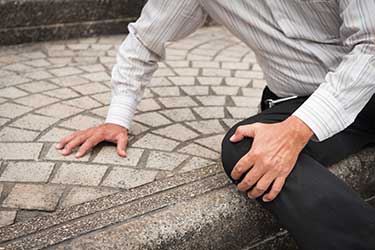 Slip and fall cases are surprisingly common. Someone goes into a business or onto private property and slips on a hazard, injuring themselves in the process.
Slip and fall cases are surprisingly common. Someone goes into a business or onto private property and slips on a hazard, injuring themselves in the process.
Often, victims suffer from serious injuries that leave them out of commission for weeks.
Winning a slip and fall lawsuit isn’t easy, but by taking the proper steps you can increase the likelihood of receiving compensation.
Identify the Hazard
People slip and fall for a variety of reasons, including:
- Slick floors
- Puddled water
- Worn carpeting
- Poor lighting
- Spilled liquids
- Foreign objects on the floor (like gravel or loose pieces of paper)
- Steep floors or steps
- Uneven floors or pavement
The key is to document the hazard as soon as possible. Ideally, you can take a picture of whatever caused you to slip so you have documented proof you fell. Take out your smartphone or ask a bystander to take a picture.
The sooner you get a picture, the better because the property owner might correct a problem soon after the accident.
Document Your Injuries
The injuries you suffer will depend on a variety of factors, including the height you fell from and how your body landed. Slipping and falling on a staircase will probably cause more injuries as you tumble to the ground and contact each step.
Common slip and fall injuries include:
- Fractures
- Dislocated joints
- Cuts or bruises
- Soft-tissue injuries like contusions or sprains and strains
- Head injuries
- Back injuries
- Traumatic brain injuries
- Spinal cord injuries
Also remember to hang onto all medical bills and receipts, which will serve as proof of your economic losses. There is no real average slip and fall compensation to speak of.
Instead, injured victims can receive money in slip and fall cases to compensate them for medical expenses, lost wages, property damage, and pain and suffering.
Consult with an Attorney
Not everyone who falls on someone’s property has a valid legal claim. Instead, slip and fall cases are based on whether the property owner or occupier exercised ordinary care in keeping up with the property.
According to O.C.G.A. 51-3-1, a landowner must exercise this care to keep the premises safe for all people invited onto the property.
Often, it is not apparent whether the landowner has used ordinary care. Generally, the owner must know of the hazard that you slipped on or should have known of the hazard before you can hold them liable in a slip and fall lawsuit.
Consult Blasingame, Burch, Garrard & Ashley, P.C.
If you have fallen at a business or a private residence, you might be entitled to a settlement, but you need an aggressive personal injury attorney in your corner.
To find out how we can help, please contact us to schedule your free consultation. Average slip and fall cases can take months to settle, so don’t delay.

